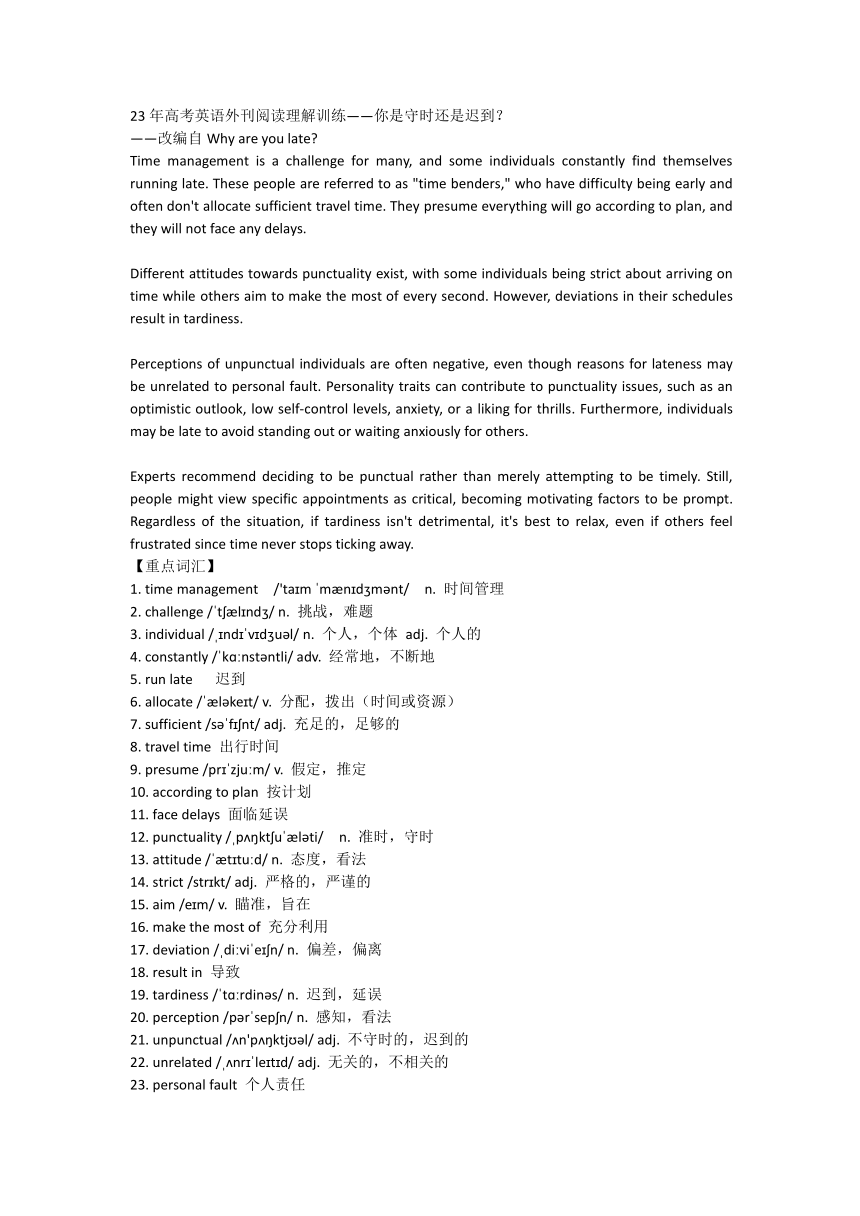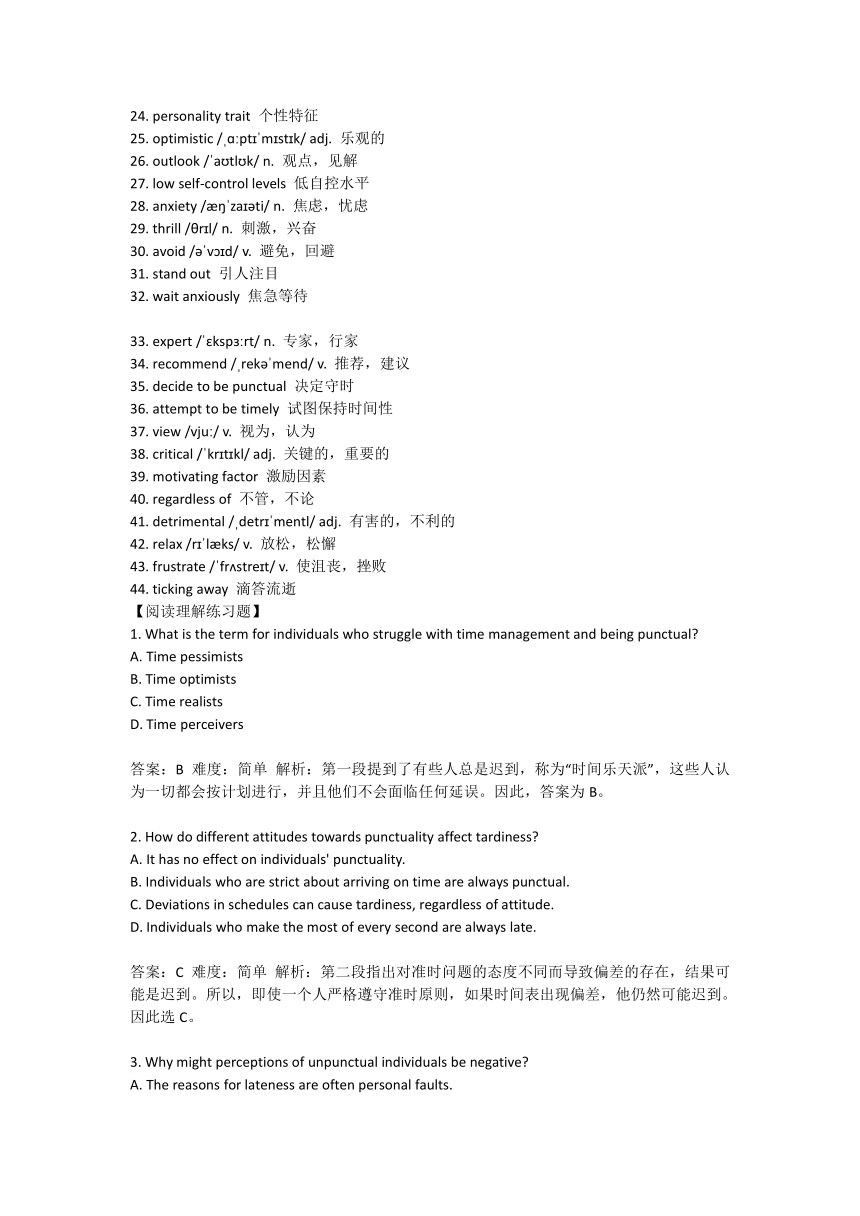2023年高三高考英语外刊阅读理解训练——你是守时还是迟到?(含解析)
文档属性
| 名称 | 2023年高三高考英语外刊阅读理解训练——你是守时还是迟到?(含解析) |  | |
| 格式 | docx | ||
| 文件大小 | 13.9KB | ||
| 资源类型 | 教案 | ||
| 版本资源 | 通用版 | ||
| 科目 | 英语 | ||
| 更新时间 | 2023-05-12 13:17:42 | ||
图片预览


文档简介
23年高考英语外刊阅读理解训练——你是守时还是迟到?
——改编自Why are you late
Time management is a challenge for many, and some individuals constantly find themselves running late. These people are referred to as "time benders," who have difficulty being early and often don't allocate sufficient travel time. They presume everything will go according to plan, and they will not face any delays.
Different attitudes towards punctuality exist, with some individuals being strict about arriving on time while others aim to make the most of every second. However, deviations in their schedules result in tardiness.
Perceptions of unpunctual individuals are often negative, even though reasons for lateness may be unrelated to personal fault. Personality traits can contribute to punctuality issues, such as an optimistic outlook, low self-control levels, anxiety, or a liking for thrills. Furthermore, individuals may be late to avoid standing out or waiting anxiously for others.
Experts recommend deciding to be punctual rather than merely attempting to be timely. Still, people might view specific appointments as critical, becoming motivating factors to be prompt. Regardless of the situation, if tardiness isn't detrimental, it's best to relax, even if others feel frustrated since time never stops ticking away.
【重点词汇】
1. time management /'ta m m n d m nt/ n. 时间管理
2. challenge / t l nd / n. 挑战,难题
3. individual / nd v d u l/ n. 个人,个体 adj. 个人的
4. constantly / kɑ nst ntli/ adv. 经常地,不断地
5. run late 迟到
6. allocate / l ke t/ v. 分配,拨出(时间或资源)
7. sufficient /s f nt/ adj. 充足的,足够的
8. travel time 出行时间
9. presume /pr zju m/ v. 假定,推定
10. according to plan 按计划
11. face delays 面临延误
12. punctuality / p kt u l ti/ n. 准时,守时
13. attitude / t tu d/ n. 态度,看法
14. strict /str kt/ adj. 严格的,严谨的
15. aim /e m/ v. 瞄准,旨在
16. make the most of 充分利用
17. deviation / di vi e n/ n. 偏差,偏离
18. result in 导致
19. tardiness / tɑ rdin s/ n. 迟到,延误
20. perception /p r sep n/ n. 感知,看法
21. unpunctual / n'p ktj l/ adj. 不守时的,迟到的
22. unrelated / nr le t d/ adj. 无关的,不相关的
23. personal fault 个人责任
24. personality trait 个性特征
25. optimistic / ɑ pt m st k/ adj. 乐观的
26. outlook / a tl k/ n. 观点,见解
27. low self-control levels 低自控水平
28. anxiety / za ti/ n. 焦虑,忧虑
29. thrill /θr l/ n. 刺激,兴奋
30. avoid / v d/ v. 避免,回避
31. stand out 引人注目
32. wait anxiously 焦急等待
33. expert / ksp rt/ n. 专家,行家
34. recommend / rek mend/ v. 推荐,建议
35. decide to be punctual 决定守时
36. attempt to be timely 试图保持时间性
37. view /vju / v. 视为,认为
38. critical / kr t kl/ adj. 关键的,重要的
39. motivating factor 激励因素
40. regardless of 不管,不论
41. detrimental / detr mentl/ adj. 有害的,不利的
42. relax /r l ks/ v. 放松,松懈
43. frustrate / fr stre t/ v. 使沮丧,挫败
44. ticking away 滴答流逝
【阅读理解练习题】
1. What is the term for individuals who struggle with time management and being punctual
A. Time pessimists
B. Time optimists
C. Time realists
D. Time perceivers
答案:B 难度:简单 解析:第一段提到了有些人总是迟到,称为“时间乐天派”,这些人认为一切都会按计划进行,并且他们不会面临任何延误。因此,答案为B。
2. How do different attitudes towards punctuality affect tardiness
A. It has no effect on individuals' punctuality.
B. Individuals who are strict about arriving on time are always punctual.
C. Deviations in schedules can cause tardiness, regardless of attitude.
D. Individuals who make the most of every second are always late.
答案:C 难度:简单 解析:第二段指出对准时问题的态度不同而导致偏差的存在,结果可能是迟到。所以,即使一个人严格遵守准时原则,如果时间表出现偏差,他仍然可能迟到。因此选C。
3. Why might perceptions of unpunctual individuals be negative
A. The reasons for lateness are often personal faults.
B. Punctual people don't understand the difficulties of being on time.
C. Negative personality traits lead to punctuality issues.
D. People are inherently impatient.
答案:A 难度:简单 解析:第三段提到虽然迟到的原因可能与个人无关,但大多数人通常会对迟到有负面看法,很可能是因为他们认为迟到是个人不够尽责的表现。因此答案为A。
4. What personality traits contribute to punctuality issues
A. Optimism, self-control, anxiety, and a liking for thrills
B. Pessimism, lack of motivation, tendency to avoid standing out, and introversion
C. Enthusiasm, competitiveness, perfectionism, and extraversion
D. Agreeableness, patience, industriousness, and openness
答案:A 难度:简单 解析:第三段指出个性特征可以造成准时问题,有些原因是个人乐观,缺乏自我控制,感到焦虑或喜欢冒险。因此选A。
5. What is the experts' recommendation for addressing punctuality issues
A. Deciding to be punctual rather than merely attempting to be timely.
B. Ignoring punctuality altogether.
C. Blaming external factors for lateness.
D. Considering specific appointments to be optional.
答案:A 难度:简单 解析:第四段提到专家建议决定要准时而不仅仅是试图按时到达。 因此答案为A。
6. What should individuals do if tardiness isn't detrimental
A. Continue to be unpunctual.
B. Avoid situations that require punctuality.
C. Relax, even if others feel frustrated.
D. Make excuses for being late.
答案:C 难度:简单 解析:最后一句话建议,如果迟到不会有任何损失,最好放松,即使别人感到沮丧,因为时间不会停止。 因此答案为C。
【全文逐句对照翻译】
时间管理对很多人来说都是一个挑战,有些人经常发现自己迟到了。
Time management is a challenge for many, and some individuals constantly find themselves running late.
这些人被称为“时间弯曲者”,他们很难早到,而且经常没有分配足够的旅行时间。
These people are referred to as "time benders," who have difficulty being early and often don't allocate sufficient travel time.
他们假定一切都会按计划进行,他们不会面临任何延误。
They presume everything will go according to plan, and they will not face any delays.
人们对守时的态度各不相同,有些人严格要求准时到达,而另一些人则力求充分利用每一秒钟。
Different attitudes towards punctuality exist, with some individuals being strict about arriving on time while others aim to make the most of every second.
然而,他们日程安排的偏差导致了迟到。
However, deviations in their schedules result in tardiness.
对不守时的人的看法通常是消极的,即使迟到的原因可能与个人过错无关。
Perceptions of unpunctual individuals are often negative, even though reasons for lateness may be unrelated to personal fault.
性格特征可能会导致守时问题,比如乐观的前景、较低的自我控制水平、焦虑或喜欢刺激。
Personality traits can contribute to punctuality issues, such as an optimistic outlook, low self-control levels, anxiety, or a liking for thrills.
此外,个人可能会迟到,以避免脱颖而出或焦急地等待别人。
Furthermore, individuals may be late to avoid standing out or waiting anxiously for others.
专家建议,要下决心做到准时,而不仅仅是试图做到准时。
Experts recommend deciding to be punctual rather than merely attempting to be timely.
不过,人们可能会认为特定的约会至关重要,成为促使他们迅速行动的因素。
Still, people might view specific appointments as critical, becoming motivating factors to be prompt.
不管是什么情况,如果迟到不是有害的,最好是放松,即使其他人感到沮丧,因为时间从来没有停止过。
Regardless of the situation, if tardiness isn't detrimental, it's best to relax, even if others feel frustrated since time never stops ticking away.
——改编自Why are you late
Time management is a challenge for many, and some individuals constantly find themselves running late. These people are referred to as "time benders," who have difficulty being early and often don't allocate sufficient travel time. They presume everything will go according to plan, and they will not face any delays.
Different attitudes towards punctuality exist, with some individuals being strict about arriving on time while others aim to make the most of every second. However, deviations in their schedules result in tardiness.
Perceptions of unpunctual individuals are often negative, even though reasons for lateness may be unrelated to personal fault. Personality traits can contribute to punctuality issues, such as an optimistic outlook, low self-control levels, anxiety, or a liking for thrills. Furthermore, individuals may be late to avoid standing out or waiting anxiously for others.
Experts recommend deciding to be punctual rather than merely attempting to be timely. Still, people might view specific appointments as critical, becoming motivating factors to be prompt. Regardless of the situation, if tardiness isn't detrimental, it's best to relax, even if others feel frustrated since time never stops ticking away.
【重点词汇】
1. time management /'ta m m n d m nt/ n. 时间管理
2. challenge / t l nd / n. 挑战,难题
3. individual / nd v d u l/ n. 个人,个体 adj. 个人的
4. constantly / kɑ nst ntli/ adv. 经常地,不断地
5. run late 迟到
6. allocate / l ke t/ v. 分配,拨出(时间或资源)
7. sufficient /s f nt/ adj. 充足的,足够的
8. travel time 出行时间
9. presume /pr zju m/ v. 假定,推定
10. according to plan 按计划
11. face delays 面临延误
12. punctuality / p kt u l ti/ n. 准时,守时
13. attitude / t tu d/ n. 态度,看法
14. strict /str kt/ adj. 严格的,严谨的
15. aim /e m/ v. 瞄准,旨在
16. make the most of 充分利用
17. deviation / di vi e n/ n. 偏差,偏离
18. result in 导致
19. tardiness / tɑ rdin s/ n. 迟到,延误
20. perception /p r sep n/ n. 感知,看法
21. unpunctual / n'p ktj l/ adj. 不守时的,迟到的
22. unrelated / nr le t d/ adj. 无关的,不相关的
23. personal fault 个人责任
24. personality trait 个性特征
25. optimistic / ɑ pt m st k/ adj. 乐观的
26. outlook / a tl k/ n. 观点,见解
27. low self-control levels 低自控水平
28. anxiety / za ti/ n. 焦虑,忧虑
29. thrill /θr l/ n. 刺激,兴奋
30. avoid / v d/ v. 避免,回避
31. stand out 引人注目
32. wait anxiously 焦急等待
33. expert / ksp rt/ n. 专家,行家
34. recommend / rek mend/ v. 推荐,建议
35. decide to be punctual 决定守时
36. attempt to be timely 试图保持时间性
37. view /vju / v. 视为,认为
38. critical / kr t kl/ adj. 关键的,重要的
39. motivating factor 激励因素
40. regardless of 不管,不论
41. detrimental / detr mentl/ adj. 有害的,不利的
42. relax /r l ks/ v. 放松,松懈
43. frustrate / fr stre t/ v. 使沮丧,挫败
44. ticking away 滴答流逝
【阅读理解练习题】
1. What is the term for individuals who struggle with time management and being punctual
A. Time pessimists
B. Time optimists
C. Time realists
D. Time perceivers
答案:B 难度:简单 解析:第一段提到了有些人总是迟到,称为“时间乐天派”,这些人认为一切都会按计划进行,并且他们不会面临任何延误。因此,答案为B。
2. How do different attitudes towards punctuality affect tardiness
A. It has no effect on individuals' punctuality.
B. Individuals who are strict about arriving on time are always punctual.
C. Deviations in schedules can cause tardiness, regardless of attitude.
D. Individuals who make the most of every second are always late.
答案:C 难度:简单 解析:第二段指出对准时问题的态度不同而导致偏差的存在,结果可能是迟到。所以,即使一个人严格遵守准时原则,如果时间表出现偏差,他仍然可能迟到。因此选C。
3. Why might perceptions of unpunctual individuals be negative
A. The reasons for lateness are often personal faults.
B. Punctual people don't understand the difficulties of being on time.
C. Negative personality traits lead to punctuality issues.
D. People are inherently impatient.
答案:A 难度:简单 解析:第三段提到虽然迟到的原因可能与个人无关,但大多数人通常会对迟到有负面看法,很可能是因为他们认为迟到是个人不够尽责的表现。因此答案为A。
4. What personality traits contribute to punctuality issues
A. Optimism, self-control, anxiety, and a liking for thrills
B. Pessimism, lack of motivation, tendency to avoid standing out, and introversion
C. Enthusiasm, competitiveness, perfectionism, and extraversion
D. Agreeableness, patience, industriousness, and openness
答案:A 难度:简单 解析:第三段指出个性特征可以造成准时问题,有些原因是个人乐观,缺乏自我控制,感到焦虑或喜欢冒险。因此选A。
5. What is the experts' recommendation for addressing punctuality issues
A. Deciding to be punctual rather than merely attempting to be timely.
B. Ignoring punctuality altogether.
C. Blaming external factors for lateness.
D. Considering specific appointments to be optional.
答案:A 难度:简单 解析:第四段提到专家建议决定要准时而不仅仅是试图按时到达。 因此答案为A。
6. What should individuals do if tardiness isn't detrimental
A. Continue to be unpunctual.
B. Avoid situations that require punctuality.
C. Relax, even if others feel frustrated.
D. Make excuses for being late.
答案:C 难度:简单 解析:最后一句话建议,如果迟到不会有任何损失,最好放松,即使别人感到沮丧,因为时间不会停止。 因此答案为C。
【全文逐句对照翻译】
时间管理对很多人来说都是一个挑战,有些人经常发现自己迟到了。
Time management is a challenge for many, and some individuals constantly find themselves running late.
这些人被称为“时间弯曲者”,他们很难早到,而且经常没有分配足够的旅行时间。
These people are referred to as "time benders," who have difficulty being early and often don't allocate sufficient travel time.
他们假定一切都会按计划进行,他们不会面临任何延误。
They presume everything will go according to plan, and they will not face any delays.
人们对守时的态度各不相同,有些人严格要求准时到达,而另一些人则力求充分利用每一秒钟。
Different attitudes towards punctuality exist, with some individuals being strict about arriving on time while others aim to make the most of every second.
然而,他们日程安排的偏差导致了迟到。
However, deviations in their schedules result in tardiness.
对不守时的人的看法通常是消极的,即使迟到的原因可能与个人过错无关。
Perceptions of unpunctual individuals are often negative, even though reasons for lateness may be unrelated to personal fault.
性格特征可能会导致守时问题,比如乐观的前景、较低的自我控制水平、焦虑或喜欢刺激。
Personality traits can contribute to punctuality issues, such as an optimistic outlook, low self-control levels, anxiety, or a liking for thrills.
此外,个人可能会迟到,以避免脱颖而出或焦急地等待别人。
Furthermore, individuals may be late to avoid standing out or waiting anxiously for others.
专家建议,要下决心做到准时,而不仅仅是试图做到准时。
Experts recommend deciding to be punctual rather than merely attempting to be timely.
不过,人们可能会认为特定的约会至关重要,成为促使他们迅速行动的因素。
Still, people might view specific appointments as critical, becoming motivating factors to be prompt.
不管是什么情况,如果迟到不是有害的,最好是放松,即使其他人感到沮丧,因为时间从来没有停止过。
Regardless of the situation, if tardiness isn't detrimental, it's best to relax, even if others feel frustrated since time never stops ticking away.
